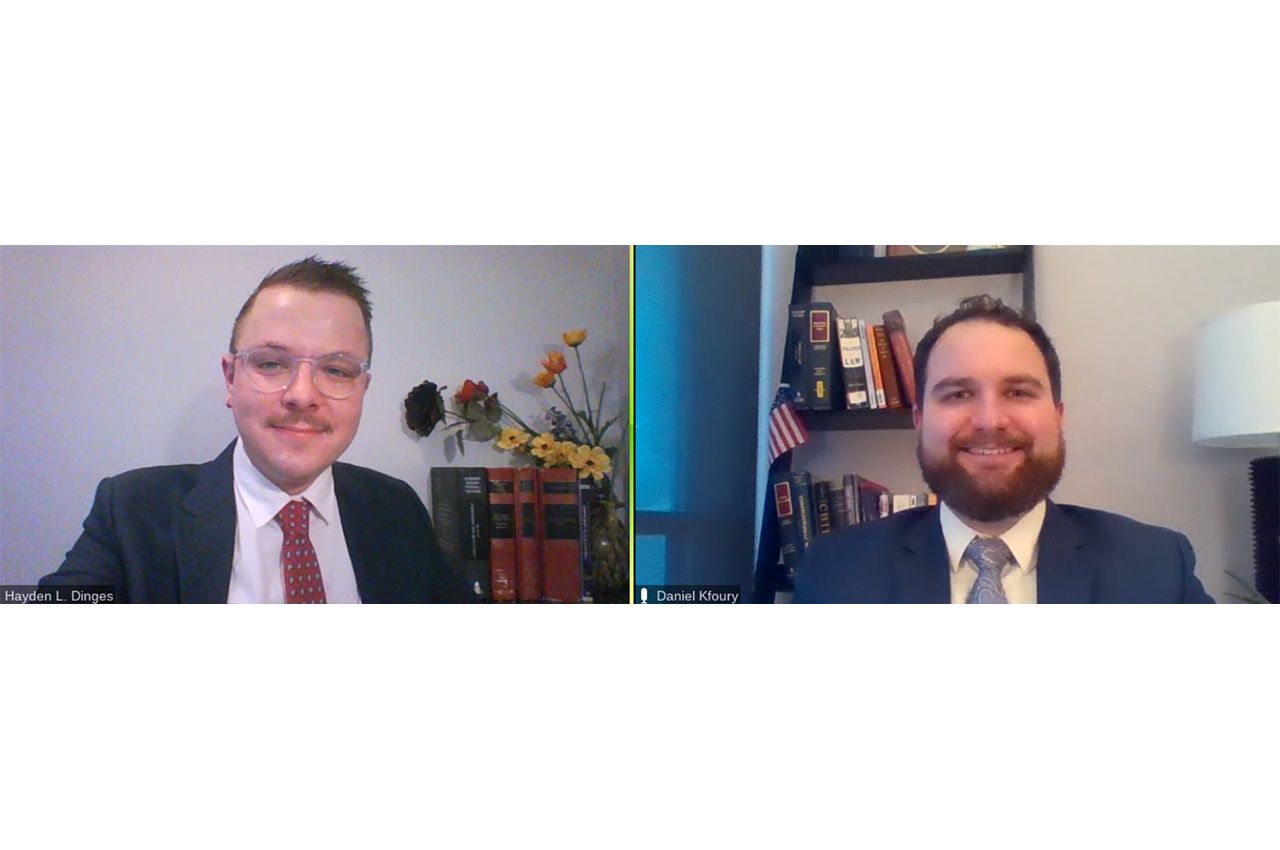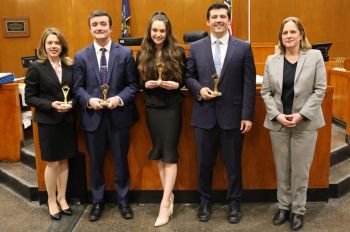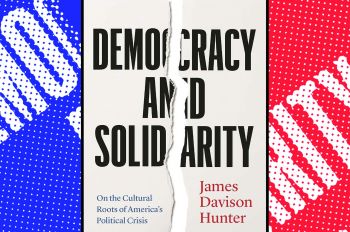Dynamic Moot Court Duo Wins “Best Brief” Award in Prestigious National Competition

Like many of their teammates, Hayden Dinges and Daniel Kfoury didn’t see moot court as a possibility when they enrolled in law school.
“I didn’t want to do it. I hate public speaking. I’ve always been a somewhat insecure person when I’m speaking,” says Dinges.
But the third-year Chicago-Kent College of Law students have become rhetorical forces this year, last week earning the “best brief” award in one of the nation’s most prestigious contests: the 2021 New York City Bar Association National Moot Court Competition.
In doing so, their writing beat out 150 teams from more than 110 law schools across the country.
And their oration earned accolades as well, garnering them a place in the quarterfinals, where judges repeatedly praised their knowledge, research, and rhetoric.
In fact, Dinges’s strong, unflinching style became so forceful, he worried he was taking it too far.
“It’s been an effort to turn the heat down. That has been my impulse: go in there guns blazing,” Dinges says.
For his part, Kfoury grew adept at pivoting and improvising, countering judges’ sudden questions with quick, calm thinking.
“Some [judges] like certain peoples’ styles and some judges don’t. That’s the gauntlet you have to run,” Kfoury says. “The most you can do is try to be yourself, give your argument, the one you are the best at giving. That’s all you can do in moot court and all you can do in life.”
Judges and contestants alike commented on the all-Zoom format of the competition this year. With the occasional connection issue and ability to emote only through a screen, Dinges and Kfoury were forced to navigate new ground.
“Navigating technical difficulties was very challenging,” Kfoury says. “Just navigating those things you wouldn’t even think about: I was on a mobile hotspot on my phone because the internet was out.”
“It was good practice for the future, being that head in the box and being able to convey your arguments over Zoom was very valuable,” Kfoury adds. “I don’t consider myself tech savvy, but I’m definitely more comfortable with it than someone banging out briefs on a typewriter.”
Despite the pair’s concerns, judges noted how comfortable Kfoury and Dinges appeared on-screen and added that Zoom hearings would likely be a lot more common in the future than people realized.
At the competition’s height, judges repeatedly noted that every competitor knew the law, the cases, the precedents. So manner and demeanor were the only things left to assess.
“It almost came down to style more than anything else,” Robert Michael, a chief justice during the February 3 quarterfinal, told the pair as they awaited results. “One of the things about litigation: It is a form of theater.”
During their final round, judges assailed Dinges and Kfoury with barrages of questions—and one judge positively critiqued how the students handled it.
“You were being pounded,” judge Dan Vogel said, “but you responded with composure, and I actually thought humility. I thought you held it together beautifully.”
Added judge Cameron Bell during another round that same night: “You guys did a really great job pivoting. I thought you guys did really good transitions, which is extremely challenging.”
The New York City Bar’s proposed problem this year involved a made-up case brought before the United States Supreme Court, addressing whether a health insurance company can sue makers of fraudulent drugs under the civil Racketeer Influenced and Corrupt Organizations Act, commonly known as RICO.
It further addressed whether an administrative subpoena served against that same health insurance provider for patients’ medical records violated the Fourth Amendment.
Dinges and Kfoury argued both sides of the case—but wrote their award-winning brief on behalf of the official who issued the subpoena. The two argued that the official had qualified immunity against liability and that the entity suing her—in this case the health insurance company—lacked standing.
Of the 150 teams that competed, Dinges and Kfoury made it to the top eight.
During regionals, the duo beat teams from the University of Illinois College of Law, UIC John Marshall Law School, University of Wisconsin Law School–Madison, and Chicago-Kent, and lost to Loyola University Chicago School of Law. In the nationals, they beat Syracuse University College of Law, lost to Cleveland-Marshall College of Law, beat the University of Oklahoma College of Law, and lost in the February 3 quarterfinal to the New York University School of Law.
“There was no time I felt we performed poorly and didn’t give it our all,” Kfoury says. “I’m also very proud of the fact that I was able to represent C-K and get our name back out there on the national moot court stage.”
Born and raised in Evanston, Illinois, Dinges received a degree in English and urban studies at Vassar College before going on to work at AmeriCorps, and later as an emergency management consultant for Federal Emergency Management Agency. He says he chose Chicago-Kent primarily because of the reputation of its legal writing program.
Kfoury, a Charleston, South Carolina, native, arrived at Chicago-Kent after a long stint working at an international shipping company. He had been there since earning history and global logistics degrees from the College of Charleston, but—wanting to have a more positive and substantial impact on society—decided to go to law school after the 2016 presidential election.
When asked if there was anyone they’d like to thank, the pair pointed at their fellow students, who participated in practices remotely via Zoom.
“A big part of the Chicago-Kent community helped here. All the friendships I made in law school paid off: the clerks, the guest judges for practices. These are law students and alumni that could be doing anything else,” Dinges says, noting that he plans to pay it forward. “It’s definitely made me more of a giver with my time.”



